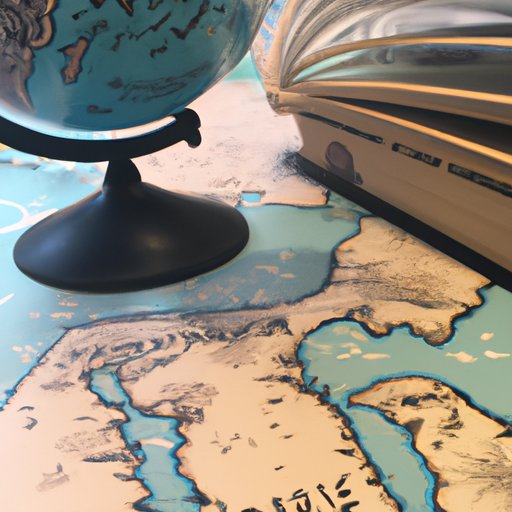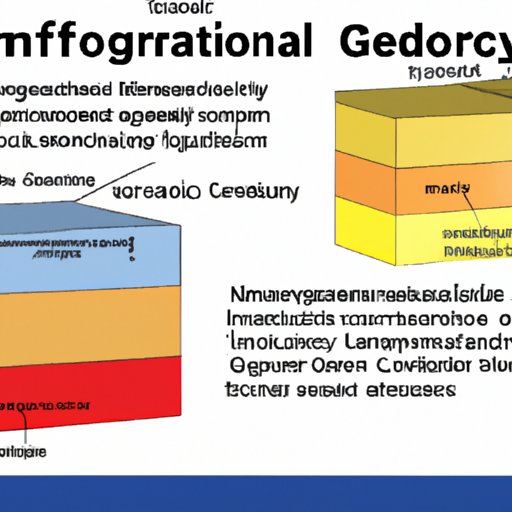Introduction
Science and geography are two distinct disciplines that often overlap in unexpected and interesting ways. Science is the systematic study of the physical world, consisting of a body of knowledge acquired through observation and experimentation. Geography is the study of the earth’s surface, including its landforms, climates, peoples, and resources. In this article, we will explore how science and geography intersect and investigate the role of geography in scientific research.

Exploring the Relationship Between Science and Geography
At first glance, it may seem as though science and geography have little in common. However, upon closer examination, it becomes clear that the two disciplines share many similarities. Both rely heavily on data collection and analysis, and both seek to uncover patterns and trends in the natural world. In addition, both draw on concepts from mathematics, physics, and chemistry in order to better understand their subject matter.
Examining How Science & Geography Intersect
Geography has long been used as a tool to enhance scientific research. For example, geographic information systems (GIS) allow researchers to map out data points and visualize patterns. GIS can be used to track the spread of disease, map out migration patterns, and analyze climate change. In addition, geographers often use satellite imagery to observe changes in the environment over time. This type of data can be used to track deforestation, urban sprawl, and the effects of natural disasters.

An Overview of Scientific Applications in Geography
In addition to using geographic techniques to further scientific research, scientists also employ scientific methods to explore geographical phenomena. For instance, meteorologists use mathematical models to predict the weather, while geologists use laboratory experiments to study the composition of rocks. Similarly, biologists use field studies to investigate the behavior of animals, and climatologists use remote sensing technology to measure environmental conditions.

Investigating the Role of Geography in Scientific Research
The importance of geography in scientific research cannot be underestimated. Geography provides a unique perspective on the physical world, allowing researchers to gain insight into phenomena that would otherwise remain hidden. By understanding the spatial relationships between different elements of the environment, scientists can gain valuable insights into how they interact and influence each other.
Mapping the Connections Between Science & Geography
The connections between science and geography can be seen in many areas of research. For example, epidemiologists use maps to trace the spread of infectious diseases, while ecologists use aerial photographs to monitor changes in land cover. Geographers also play an important role in the study of biodiversity and conservation, providing data on the distribution of species and habitats.
The Impact of Geography on Scientific Discoveries
The impact of geography on scientific discoveries cannot be overstated. The spatial relationships between different elements of the environment can provide invaluable insights into the processes at work. As one researcher notes, “Geography is essential for understanding the complex interactions among people, the environment, and the biosphere. Without it, our understanding of the world would be incomplete.”1
Understanding the Link between Science & Geography
The link between science and geography is more than just a theoretical connection. In reality, the two disciplines complement each other in meaningful ways. By studying them together, students can gain a deeper understanding of the physical world, and develop the skills necessary to make informed decisions about the environment.
Identifying the Benefits of Studying Science & Geography Together
Studying science and geography together can be beneficial in a number of ways. First, it helps students develop critical thinking skills, as they must consider the implications of their findings and weigh the evidence against competing theories. Additionally, it encourages creativity, as students must come up with innovative solutions to challenging problems. Finally, it fosters an appreciation for the interrelatedness of different aspects of the environment, which is essential for making informed decisions about the future.
Examples of Scientific Research Informed by Geography
The potential applications of science and geography are vast and varied. For example, geographers have used GIS to map out the spread of Zika virus in Brazil, while scientists have used remote sensing technology to study the effects of deforestation in the Amazon rainforest. In addition, geographers and economists have collaborated to create models that predict the impact of climate change on global food production.
Conclusion
In conclusion, science and geography are two distinct yet interconnected disciplines. While geography provides a unique perspective on the physical world, science offers valuable insights into the processes at work. By studying these two disciplines together, students can gain a deeper understanding of the environment and develop the skills necessary to make informed decisions about the future.
Summary of the Relationship between Science and Geography
Science and geography are two distinct yet interconnected disciplines. Geography provides a unique perspective on the physical world, while science offers valuable insights into the processes at work. By studying these two disciplines together, students can gain a deeper understanding of the environment and develop the skills necessary to make informed decisions about the future.
Implications for Further Study
The intersection of science and geography is a fertile area for further exploration. Future research might focus on developing new methods for using geographic data to inform scientific research, or examining how the two disciplines can be combined to create innovative solutions to global problems.
(Note: Is this article not meeting your expectations? Do you have knowledge or insights to share? Unlock new opportunities and expand your reach by joining our authors team. Click Registration to join us and share your expertise with our readers.)
